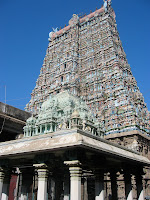Meenakshi Temple, Madurai
All over southern India you can find barefoot pilgrims from all walks of life travelling along the roads. Usually they are recognizable by their matching colored lunghis or the markings on their foreheads, sometimes they carry banners or sing songs. The decision to put your job and family life on hold and walk barefooted to a sacred temple is actually fairly commonplace and pilgrims come from all socioeconomic groups. The major destinations in southern India include the Venkateshwara Temple in Tirupati, Andhra Pradesh, the Ayeppa Temple in Kerala, Kanyakumari at the southern tip of India, and this place, the Sri Meenakshi Temple in Madurai.
The temple city has existed since antiquity but the current temple was built in the 1600s. There are references to the town and the rituals celebrated there in the writings of ancient Greek historians and many of the rites have been performed essentially unchanged continuously for over a thousand years.
The temple has 12 of these towers, called gopuras, the largest of which is 7 stories tall. They are covered in small individually painted sculptures of various deities or other figures from Hindu mythology.
They are covered in small individually painted sculptures of various deities or other figures from Hindu mythology.

The temple is believed to have over 3 million sculptures.


Detail of gopura sculpture.

The temple city has existed since antiquity but the current temple was built in the 1600s. There are references to the town and the rituals celebrated there in the writings of ancient Greek historians and many of the rites have been performed essentially unchanged continuously for over a thousand years.
The temple has 12 of these towers, called gopuras, the largest of which is 7 stories tall.
 They are covered in small individually painted sculptures of various deities or other figures from Hindu mythology.
They are covered in small individually painted sculptures of various deities or other figures from Hindu mythology.
The temple is believed to have over 3 million sculptures.

Ceilings are painted with colorful mandalas.

Detail of gopura sculpture.

Bathing tank for ritual cleansing prior to worship.

Comments